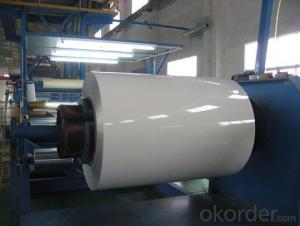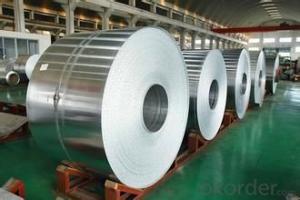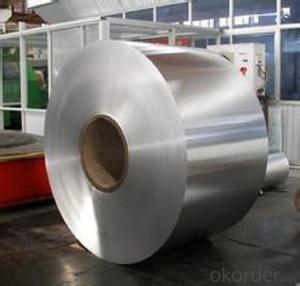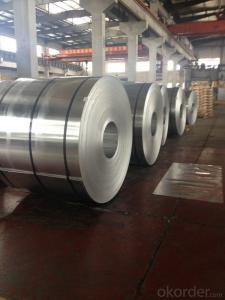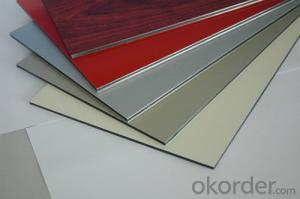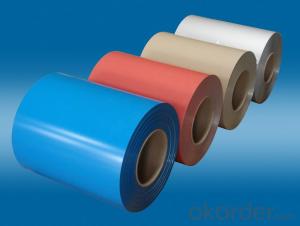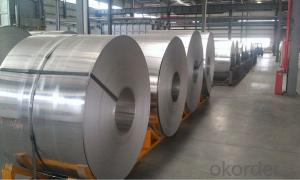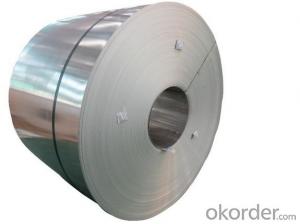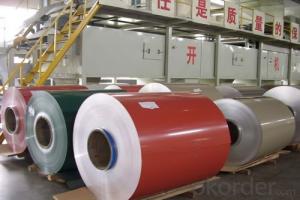Skid Aluminum Coil for Coated Aluminum Honeycomb Panel
- Loading Port:
- Shanghai
- Payment Terms:
- TT OR LC
- Min Order Qty:
- 2 m.t.
- Supply Capability:
- 50000 m.t./month
OKorder Service Pledge
OKorder Financial Service
You Might Also Like
Specification
Coated Aluminium Coil/Roll For Aluminium Honeycomb Panel
Description
Alloy | 1060, 1100, 3003, 8011, etc. |
Temper | H16, H18, H24, H26, H28 |
Thickness | From 0.05mm to 3.0mm |
Width | Standard width:1240mm |
Special width:1300mm, 1520mm, 1570mm, 1595mm | |
Diameter | Standard dia:1200mm |
Interior dia:150mm,405mm,505mm | |
Weight | 2.5 T/coil,3.0 T/coil |
Coating | PE, PVDF, ACRYLIC |
Surface | Embossed, mill finish, coated |
Color | AS to code RAL |
Gloss | 10-90%(EN ISO-2813:1994) |
Coating Thickness | PE: more than 18 micron |
PVDF: more than 25 micron | |
Coating Hardness(pencil resistance) | More than 2h |
Coating adhesion | 5J (EN ISO-2409:1994) |
Impact Resistance | No peeling or cracking(50 kg/cm,ASTMD-2794:1993) |
Flexibility(T-bend) | 2T |
MEK resistance | More than 100 |
Advantage | 1.High temperature resistant 2.Weathering resistant 3.Scrubbing resistant 5.Acid or alkali proof 6. Fireproof 7.Light weight material is easy to construct and install |
Out package | Wooden splint with export standard |
Application | ACP, wall cladding, facades, roofs and canopies, ceilings, signboards, blind window, display platforms, electrical panels, etc |
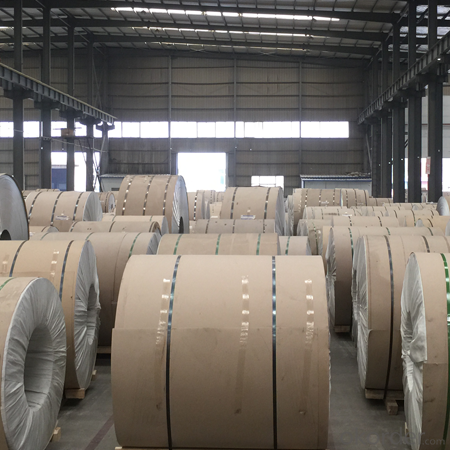
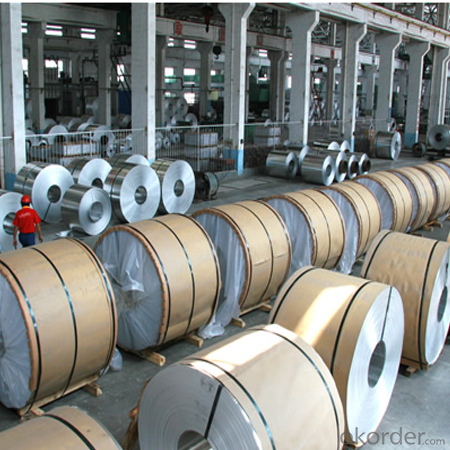
Manufacturing
Decoiler → Accumulator →Tension Leveler →Acid & Alkali Cleaner → Rinse →Conversion Treatment → Priming coater →Infrared Curing Oven →Main coater →Floatation Curing Oven →Strippable Film Applicator → Exit Accumulator → Recoiler
FAQ
--Q: Do you provide free samples?
--A: Yes, free samples will be sent to you on freight at destination.
--Q: Can I get your latest products catalogue?
--A: Yes, it will be sent to you in no time.
--Q: What is the MOQ?
--A: 2 tons
--Q: What are your payment terms?
--A: We accept L/C, T/T.
--Q: What kinds of alloy can you supply?
--A: 1000 series: 1050, 1060, 1070, 1100, 1145, 1200
3000 series: 3003, 3004, 3105, 3104
5000 series: 5052, 5083, 5754, 5182
6000 series: 6061, 6063, 6062, 6063
8000 series: 8011, 8021
--Q: What kinds of temper can you supply?
--A: O-H112: O,H12,H14,H16,H18,H22,H24,H26,H,32,H34,H111,H112
T3, T4, T6
- Q: Can aluminum coils be used in solar panel installations?
- Indeed, solar panel installations can make use of aluminum coils. The lightweight properties, corrosion resistance, and remarkable thermal conductivity of aluminum make it a favored material for constructing solar panels. Frequently, aluminum coils are employed as the supportive backing material for solar panels, ensuring both structural stability and effective heat dissipation. Additionally, these coils are commonly utilized in the production of solar mounting systems, which securely hold the panels in position. All in all, aluminum coils present a dependable and efficient choice for solar panel installations.
- Q: How to pull the aluminum coil purchased into aluminum sheet?
- You can use decoiler machine, but after decoiling, the embossment of embossed aluminum sheet will become very shallow.
- Q: Can aluminum coils be used in the production of cryogenic storage tanks?
- Cryogenic storage tanks can incorporate aluminum coils, as aluminum is a suitable material for such purposes. This is due to its low density, high thermal conductivity, and excellent resistance to corrosion. These attributes make it an excellent choice for the storage and transportation of cryogenic liquids like liquid nitrogen, oxygen, and argon. Aluminum coils can be utilized to construct the internal shell of the tank, which offers a lightweight and durable solution. Moreover, aluminum is highly malleable, enabling the creation of intricate tank shapes and designs. However, it is crucial to consider that aluminum has a higher coefficient of thermal expansion compared to materials such as stainless steel. Therefore, adequate design measures must be implemented to accommodate thermal contraction and expansion during cryogenic operations.
- Q: What are the common surface repair methods for aluminum coils?
- Aluminum coils can be repaired using various surface repair methods. Mechanical repair is one of the most commonly used techniques. It involves sanding or grinding the affected area to eliminate corrosion and imperfections. Following this, a filler or putty is applied to even out the surface and create a seamless repair. Once the filler has dried, the repaired section can be sanded again to achieve a smooth finish. Chemical repair is another popular method. It entails utilizing specialized chemicals to eliminate oxidation or corrosion from the aluminum coil's surface. This is done by directly applying the chemical to the damaged area and allowing it to react with the surface, breaking down any corrosion or oxidation. After the chemical has completed its task, the coil is rinsed, dried, and any remaining imperfections are addressed using mechanical repair methods. Heat repair methods can also be employed in certain cases. This involves using a heat gun or torch to heat the damaged portion, making the aluminum soft and malleable. Once heated, the metal can be reshaped or manipulated to remove dents or deformations. Careful control of the heat is necessary to prevent further damage to the coil. Lastly, anodizing is a commonly used surface repair method. It involves applying a protective coating to the coil's surface, which not only repairs any damage but also provides additional protection against future corrosion or oxidation. Anodizing is often chosen for more extensive repairs or when the coil will be exposed to harsh environments. The choice of surface repair method for aluminum coils depends on the extent of the damage and the desired outcome. It is advisable to consult with a professional or follow the manufacturer's guidelines to ensure optimal results and extend the coil's lifespan.
- Q: Are there any recycling programs for used aluminum coils?
- Indeed, recycling programs for used aluminum coils are readily accessible. Aluminum, being highly recyclable, can be melted down and repurposed without compromising its quality. Numerous recycling centers and scrap metal yards willingly accept aluminum coils for recycling purposes. Furthermore, certain HVAC companies, which frequently employ aluminum coils in air conditioning systems, have implemented their own recycling initiatives. It is advisable to consult your local recycling center or HVAC companies to obtain information regarding the specific recycling programs available for used aluminum coils in your vicinity.
- Q: What are the rules and guidelines that govern the transport of aluminum coils?
- <p>Yes, there are specific regulations for the transportation of aluminum coils. These include adhering to weight limits, ensuring proper packaging to prevent damage, and following guidelines for secure loading and unloading. Compliance with hazardous materials regulations is also crucial if the coils are being transported internationally. It's important to check with the specific transportation authority or consult the International Air Transport Association (IATA) and International Maritime Dangerous Goods (IMDG) codes for detailed guidelines.</p>
- Q: I wrap everything with aluminum foil and bake it in the oven -- fish, meat, vegetables. Is this really safe? Or safe when done occasionally? Or should I find a new way?
- Aluminum Foil Safety
- Q: This question asks for the method to measure the dimensions of an aluminum coil.
- <p>To measure the size of an aluminum coil, you'll need to measure its diameter, width, and thickness. Use a tape measure or a caliper to measure the coil's diameter and width. For the thickness, a micrometer or a coil thickness gauge can be used. Ensure the coil is laid flat and measure at several points to get an average thickness. If the coil is wound, you may need to unroll it partially to take accurate measurements. Always follow the manufacturer's guidelines for your specific measuring tools to ensure accuracy.</p>
- Q: Can aluminum coils be used for solar panel applications?
- Yes, aluminum coils can be used for solar panel applications. They are often utilized as the base material for solar panels due to their lightweight, corrosion-resistant, and durable properties. Additionally, aluminum coils offer good thermal conductivity, enabling efficient heat dissipation in solar panels.
- Q: Can aluminum coils be used in the production of aluminum foil?
- Indeed, the utilization of aluminum coils is viable in the manufacturing of aluminum foil. Normally, aluminum coils are generated through the process of rolling aluminum ingots between substantial rollers, resulting in the formation of slender and level sheets. Subsequently, these coils can be subjected to additional procedures to yield aluminum foil. The coils are unwound and conveyed through a sequence of rolling mills that gradually diminish the thickness of the metal until the desired gauge for aluminum foil is attained. Following this, the foil is sliced into sheets or wound into rolls for the purpose of packaging and distribution. Aluminum coils offer a cost-efficient and effective means to generate substantial quantities of aluminum foil.
Send your message to us
Skid Aluminum Coil for Coated Aluminum Honeycomb Panel
- Loading Port:
- Shanghai
- Payment Terms:
- TT OR LC
- Min Order Qty:
- 2 m.t.
- Supply Capability:
- 50000 m.t./month
OKorder Service Pledge
OKorder Financial Service
Similar products
Hot products
Hot Searches
Related keywords
